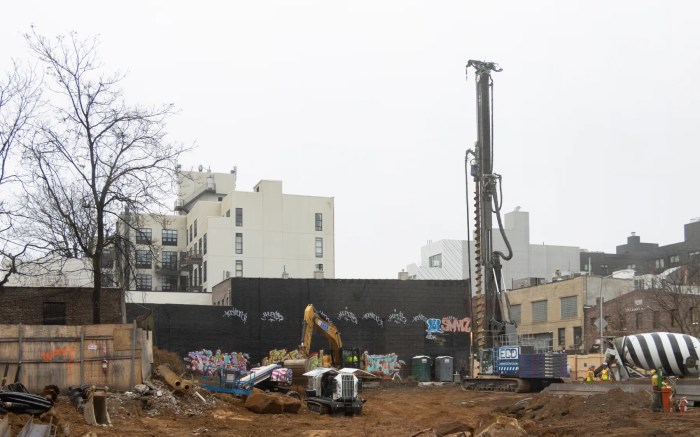By Terry J. Allen
Despite four years, and four more years, Nadine Strossen, president of the
American Civil Liberties Union, remains optimistic about the struggle to roll back the Patriot Act and protect civil liberties in America. At the same time, she calls the current situation “the worst of both worlds: We are less free and less safe.”
Strossen spoke at a salon organized by The New Shul, a 6-year-old, progressive, unaffiliated Jewish congregation based in the West Village. Its 120 families “seek community and a spiritual home,” said Amy Eichenwald Golding, New Shul’s executive director.
The Downtown Salons are open to the public and held in the basement of the Cornelia Street Cafe. The Nov. 15 event, “The Gravity of Laws: Can the Patriot Act Coexist With Our Civil Liberties and After 9/11?” drew about 40 people of varying ages and nationalities. After Strossen’s opening remarks, the participants broke into small groups to consider the tension between security and liberty. When they reassembled, Strossen and salon host Esther Perel led a vibrant discussion.
Throughout, Strossen juggled optimism and outrage. Her outrage sprang from such Patriot Act provisions as requiring librarians to report secretly on patrons’ reading habits, as well as from the administration’s use of the designation “enemy combatants” to circumvent the obligations of international law.
Strossen based her optimism on the imperatives of activism (“You can’t be an activist without being an optimist,” she said) and on the lessons of history. When Congress passed the 1798 Alien and Sedition Act that made it a crime to criticize the government, Thomas Jefferson advised patience. Strossen quoted from his letter: “This is a game where principles are the stake….We shall see the reign of witches pass over.”
And then return. Beginning with that 18th-century precedent, said Strossen, and consistently throughout American history, “presidents scapegoat civil liberties when national security is threatened.” She cited Lincoln’s suppression of habeas corpus during the Civil War, Roosevelt’s internment of Japanese Americans during W.W. II and Clinton’s Antiterrorism Act. But each time, Strossen noted, history condemned these policies. The Constitution itself, written at a time of dire national emergency, said Strossen, is an example of how a nation under threat is strengthened by protecting civil liberties rather than curtailing them.
That same spirit is alive today, Strossen said, in red as well as blue states, where opposition to the Patriot Act has been vigorous and widespread. “There is a broad bipartisan coalition, from the grassroots to Congress and the Supreme Court, that has said it won’t compromise on liberties,” she noted. In what she called an “extraordinary local-level effort,” four states and some 360 communities across the country, including New York, have passed pro-civil liberties resolutions.
Nonetheless, Strossen acknowledges that much of the picture is grim. A group of Arab-American lawyers, for example, recently told her that they can no longer fly, sign petitions or participate in normal civic life without fear of intimidation or worse.
The mentality that civil liberties must be sacrificed to perceived security concerns was evidenced in New York City during the Republican National Convention, said Strossen. “Whenever the president or the vice president is in attendance, there is a documented pattern by the Secret Service of pushing aside anyone with a negative sign or message. So I think selective crowd control is part of the post-9/11 world. And it falls on those who dissent.”
In the face of these incursions on civil liberties, Strossen stressed the continuing need for vigilant and principled opposition. The appointment of Alberto Gonzales as attorney general to succeed John Ashcoft is worrying, she said, because Gonzales authored the memos that ended up justifying less stringent applications of international laws against war crimes. Many U.S. military leaders,” said Strossen, “are dead set against” the administration’s erosion of the Geneva Conventions and bans on torture. They argue that if international standards are relaxed, U.S. troops, too, will be vulnerable to mistreatment.
Some of the salon participants had felt the effects of the post-9/11 environment firsthand. A young Iranian woman said she had chosen to come to America because of its guarantees of rights, but now worries that “I may have come at the wrong time.”
The evening was not without its light moments. The A.C.L.U., said Strossen is nonpartisan — an equal-opportunity critic of anyone and any administration that threatens constitutionally protected liberties. Nonetheless, she said she couldn’t resist telling a joke that asked why the Republicans had changed their symbol from an elephant to a condom: Because, she said, condoms “accept inflation, halt production, disrupt the next generation, protect pricks and give a sense of security while getting screwed.” Salon participants laughed with delight.
The series of evening salons are sponsored by Jewish Below 14th, which is a project of the Educational Alliance, with funding from UJA-Federation of New York. The monthly events are designed to be a “public feast for hungry minds,” said Eichenwald Golding.
“After post 9-11 there was a need for conversation and human contact,” she said. “Nadine provided us with questions that fed us well, but left us hungry for more.”
More will be available at the next Downtown Salon at 6 p.m. on Dec. 13 at the Cornelia Street Cafe, 29 Cornelia St., at W. Fourth St. Michael Massing, a writer for The New York Review of Books will discuss “How and Why the Press Keeps Letting Us Down on Iraq.”
WWW thevillager.com







































